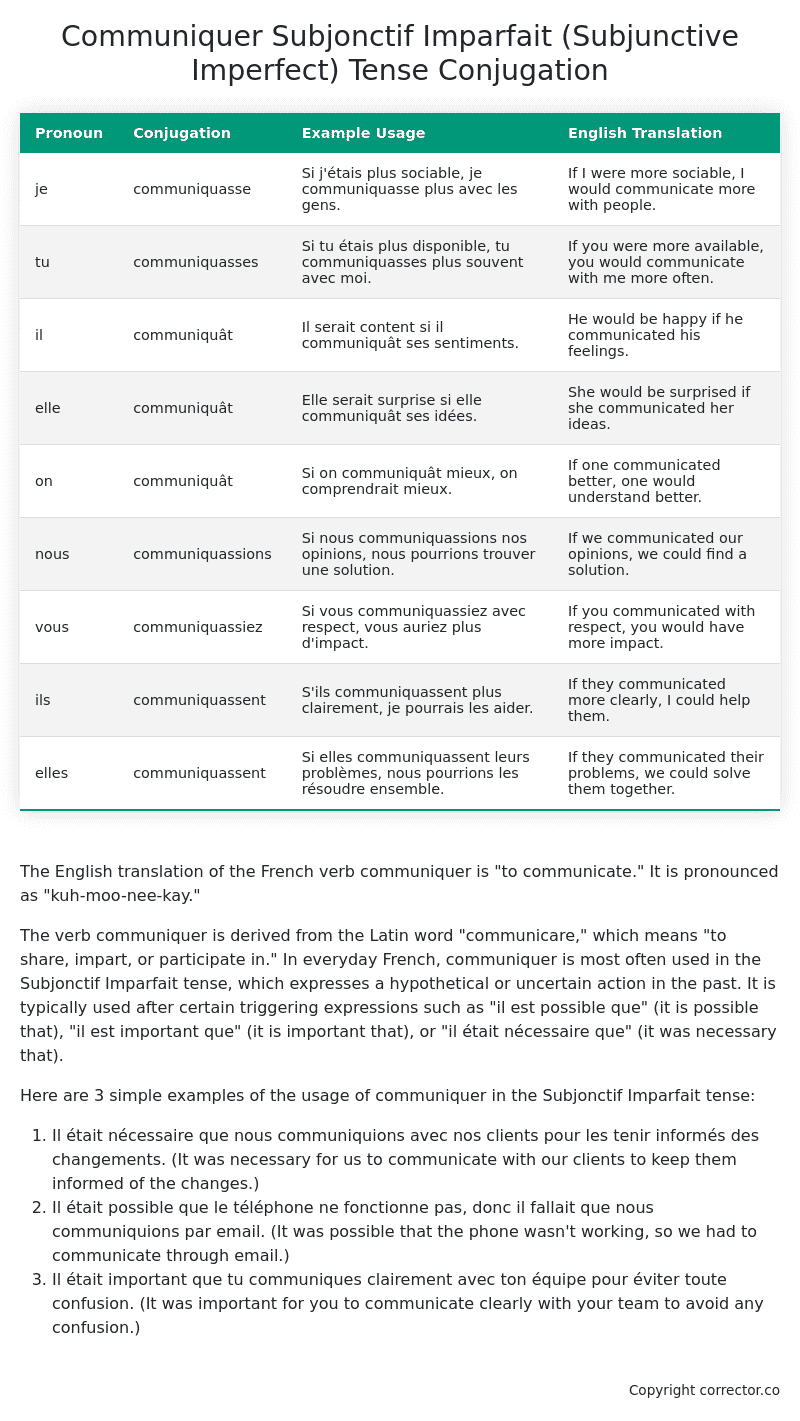Subjonctif Imparfait (Subjunctive Imperfect) Tense Conjugation of the French Verb communiquer
Introduction to the verb communiquer
The English translation of the French verb communiquer is “to communicate.” It is pronounced as “kuh-moo-nee-kay.”
The verb communiquer is derived from the Latin word “communicare,” which means “to share, impart, or participate in.” In everyday French, communiquer is most often used in the Subjonctif Imparfait tense, which expresses a hypothetical or uncertain action in the past. It is typically used after certain triggering expressions such as “il est possible que” (it is possible that), “il est important que” (it is important that), or “il était nécessaire que” (it was necessary that).
Here are 3 simple examples of the usage of communiquer in the Subjonctif Imparfait tense:
- Il était nécessaire que nous communiquions avec nos clients pour les tenir informés des changements. (It was necessary for us to communicate with our clients to keep them informed of the changes.)
- Il était possible que le téléphone ne fonctionne pas, donc il fallait que nous communiquions par email. (It was possible that the phone wasn’t working, so we had to communicate through email.)
- Il était important que tu communiques clairement avec ton équipe pour éviter toute confusion. (It was important for you to communicate clearly with your team to avoid any confusion.)
Table of the Subjonctif Imparfait (Subjunctive Imperfect) Tense Conjugation of communiquer
| Pronoun | Conjugation | Example Usage | English Translation |
|---|---|---|---|
| je | communiquasse | Si j’étais plus sociable, je communiquasse plus avec les gens. | If I were more sociable, I would communicate more with people. |
| tu | communiquasses | Si tu étais plus disponible, tu communiquasses plus souvent avec moi. | If you were more available, you would communicate with me more often. |
| il | communiquât | Il serait content si il communiquât ses sentiments. | He would be happy if he communicated his feelings. |
| elle | communiquât | Elle serait surprise si elle communiquât ses idées. | She would be surprised if she communicated her ideas. |
| on | communiquât | Si on communiquât mieux, on comprendrait mieux. | If one communicated better, one would understand better. |
| nous | communiquassions | Si nous communiquassions nos opinions, nous pourrions trouver une solution. | If we communicated our opinions, we could find a solution. |
| vous | communiquassiez | Si vous communiquassiez avec respect, vous auriez plus d’impact. | If you communicated with respect, you would have more impact. |
| ils | communiquassent | S’ils communiquassent plus clairement, je pourrais les aider. | If they communicated more clearly, I could help them. |
| elles | communiquassent | Si elles communiquassent leurs problèmes, nous pourrions les résoudre ensemble. | If they communicated their problems, we could solve them together. |
Other Conjugations for Communiquer.
Le Present (Present Tense) Conjugation of the French Verb communiquer
Imparfait (Imperfect) Tense Conjugation of the French Verb communiquer
Passé Simple (Simple Past) Tense Conjugation of the French Verb communiquer
Passé Composé (Present Perfect) Tense Conjugation of the French Verb communiquer
Futur Simple (Simple Future) Tense Conjugation of the French Verb communiquer
Futur Proche (Near Future) Tense Conjugation of the French Verb communiquer
Plus-que-parfait (Pluperfect) Tense Conjugation of the French Verb communiquer
Passé Antérieur (Past Anterior) Tense Conjugation of the French Verb communiquer
Futur Antérieur (Future Anterior) Tense Conjugation of the French Verb communiquer
Subjonctif Présent (Subjunctive Present) Tense Conjugation of the French Verb communiquer
Subjonctif Passé (Subjunctive Past) Tense Conjugation of the French Verb communiquer
Subjonctif Imparfait (Subjunctive Imperfect) Tense Conjugation of the French Verb communiquer (this article)
Conditionnel Présent (Conditional Present) Tense Conjugation of the French Verb communiquer
Conditionnel Passé (Conditional Past) Tense Conjugation of the French Verb communiquer
L’impératif Présent (Imperative Present) Tense Conjugation of the French Verb communiquer
L’infinitif Présent (Infinitive Present) Tense Conjugation of the French Verb communiquer
Struggling with French verbs or the language in general? Why not use our free French Grammar Checker – no registration required!
Get a FREE Download Study Sheet of this Conjugation 🔥
Simply right click the image below, click “save image” and get your free reference for the communiquer Subjonctif Imparfait tense conjugation!

Communiquer – About the French Subjonctif Imparfait (Subjunctive Imperfect) Tense
Formation
Common Everyday Usage Patterns
Interactions with Other Tenses
Subjonctif Présent
Indicatif Passé Composé
Conditional
Conditional Perfect
Summary
I hope you enjoyed this article on the verb communiquer. Still in a learning mood? Check out another TOTALLY random French verb conjugation!


